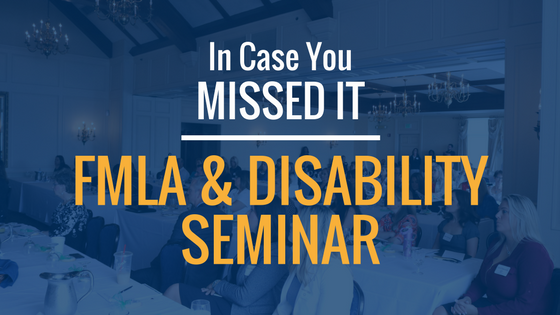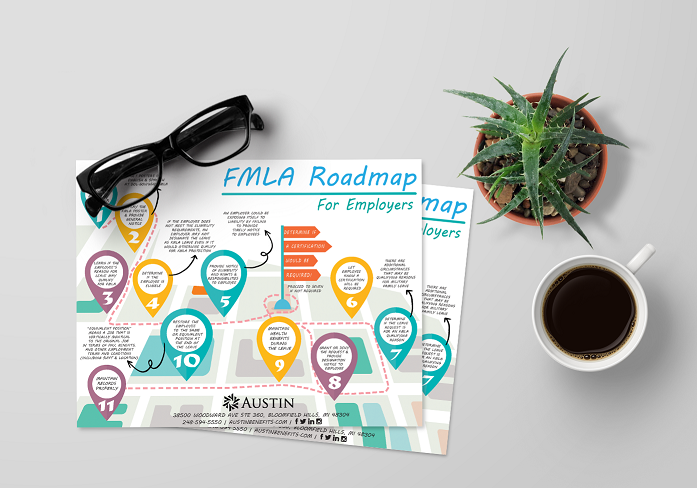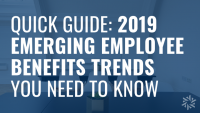
On June 22nd, Austin Benefits Group hosted a seminar with several different presentations including a special guest speaker to delve into FMLA & Disability. Jason Petsche from Guardian joined us and discussed many of the personal situations affecting our attendees and their businesses.
Moving Forward: Achieving Absence Management Momentum
FMLA Fundamentals
The Family Medical Leave Act provides 12 or 26 weeks of unpaid leave in a 12-month period, job protection, continued health benefits, and requires employers to track time accurately. Private employers with 50 or more employees in a 75-mile radius are required to meet FMLA requirements. Employees are eligible for FMLA leave with 12 consecutive months of employments and 1,250 hours worked for an eligible employer in the year prior to their request for leave.
FMLA qualified reasons for leave include: birth of a child, adoption of a child, care of a child/spouse/parent with a serious health condition, an employee’s own serious health condition, military leave, caregiver leave, etc. A difficult part of FMLA compliance for employers is determining the employee’s qualifying status without asking for specific medical condition or disability.

FMLA leave can be taken in one of three ways: continuous, intermittent, or reduced schedule. Intermittent leave may be taken for all qualifying reasons except parental/bonding leave. Intermittent leave may be used in cases when an employee needs physical therapy, chemotherapy or suffers from irregular medical issues such as migraines. An employer can require appointments to be scheduled when least disruptive to business operations, subject to a health care professional’s approval.
To help illustrate the fundamentals of the FMLA, we put together a visual roadmap to accompany Petsche’s discussion. You can download this handy roadmap below.

Trends & Management
It is considered best practice to include all employees, regardless of location in your leave policy for consistency and tracking. Employers who are expecting to expand to 50 or more employees soon, may consider implementing FMLA equivalent policies to bridge the transition.
The top reasons for FMLA Non-Compliance are: counting FMLA leaves toward absentee policy, taking disciplinary action or terminating for using FMLA, failure to notify employees of FMLA rights, failure to issue eligibility determinations, failure to grant qualified leaves, failure to follow FMLA certification requirements, and failure to reinstate employees to the same/equivalent position upon return to work.
Employers with difficulty managing FMLA and other disability leaves may consider outsourcing the process. If you already offer short-term and/or long-term disability benefits, you may be able to centralize with your existing carrier. Please talk to your dedicated Austin Account Director or contact us directly for more information.
Benefits Strategy for a Multi-Generational Workforce
Benefits Customization & Communication
Lauren Fabbri, Director of Account Services, gave our attendees an overview of Benefits Strategy for the Multi-Generational Workforce. There is a lot of discussion on the stereotypical differences between generations, the Austin team prefers to consider the many ways the generations are similar and how they are all looking towards the future. The Austin team itself is currently made up of three generations, 51% Generation X, 39% Generation Y (Millennials), and 10% Baby Boomers. Do you know the generational breakdown of your company?

While most of the generations currently in the workforce like to use technology (yes, even Boomers!) many still prefer the reassurance of one-on-one and in-person communication, especially when it comes to benefits. Pursuing technology in benefits is still important to add convenience and increase accessibility, but employers should not lose sight of the value of personal touch.
Ultimately, all of us are looking for “benefits for me”, but how can employers achieve this with the current level of differences in the workforce? The Austin approach is to add opportunity for customization & voluntary options as much as you can. Often voluntary benefits or a few trendy perks add little cost and add a lot of appeal to your total rewards package.
Remember to consider your employees’ personal needs, if only 20% of your employees have pets, pet insurance may not be the best investment. An annual survey is an easy way to gauge employees’ interests and gain feedback on their experience with carriers, claims, and other issues with your total rewards package.

AHCA Update & Austin Outlook
Dean Austin, President & CEO, closed our seminar with a look at the AHCA as passed by the House and a glance at workforce trends going into this year and beyond.
The Senate unveiled their version of the AHCA on the day of our seminar, with changes from the House version, so it is safe to say that there are aspects still under debate in both the House & Senate, which likely means a decision is still months away. Remember that the Senate still needs to vote on their version of the bill, which will then go back to a House & Senate joint committee for review and final vote. The very last step is sending the bill to the White House for either a signature or veto from the president.
Dean went over concerns regarding several of the key areas including issues surrounding pre-existing conditions, rating, and employer choice. Ultimately, the Austin recommendation is for employers to continue to focus on the law of the land, the ACA. It is imperative that employers not lose sight of compliance. Your Austin team will continue to observe the development of the AHCA and will continue to keep our clients updated of changes that will affect them.
We are continuing the see carriers abandon the ACA individual markets, which will increase employee’s reliance and desire for employer-sponsored health plans. It is important to continue employee (and family) education into how their health benefits work and how to get the most for their healthcare dollar. Focusing on improving wellness both physical and financial offers large benefits for employers and employees.
For questions regarding our recent seminar topics or materials, please contact your dedicated Austin Account Director or email ericak@austinbenefits.com.



